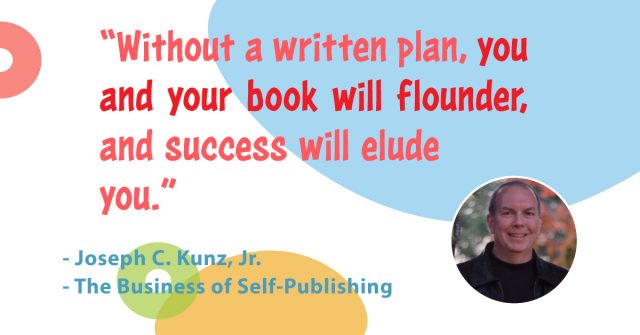Podcast: Play in new window | Download
Subscribe: Apple Podcasts | Spotify | Pandora | RSS | More
Updated February 8, 2023
Subtitle
Without a plan, you and your book will flounder, and success will elude you
Synopsis
Whether you are about to self-publish your first book or start a micro-niche publishing company, you must have a business plan. A business plan will give you an essential roadmap for your new business. Creating a one-page business plan is an easy and quick way to do this. So, here is a list of five questions you must ask yourself before writing your one-page business plan.

What You Will Learn
1. You will learn the basic questions you must ask yourself before writing your plan.
2. You will learn to determine what micro-niche you should pursue and why.
3. You will learn how and why these questions help you create a successful book.
Introduction
Whether you are about to self-publish your first book or start a micro-niche publishing company, you must have a business plan. A business plan will give you an essential roadmap for your new business. Creating a one-page business plan is an easy and quick way to do this.
This plan will help you clarify your thinking about your new business. This short, one-page plan is also helpful as an outline for a more extended, in-depth plan. With some research, you should be able to complete this one-page plan in under one week.

So, here is a list of five questions that you must ask yourself before writing your one-page business plan:
Question # 1. WHY Do You Want to Self-Publish?
Your answer cannot be only about money. It needs something more than that. It also needs to be short, very specific, and very personal.
Examples:
a. “I want to write a book to help new nurses be more productive, effective, and marketable in today’s competitive job market.”
b. “I want to write small-business management books to share my knowledge and expertise with others who want to start their small business. I gained this knowledge and experience over the last 35 years while starting and managing my successful small business.”
c. “I want to write and self-publish a book to give myself more credibility in the eyes of my peers.”
Question # 2. WHAT Will You Write?
Explain it in one sentence, in precise detail. You must understand what your writing niche, or specialty, will be.
Examples:
a. “I will write and publish books about all aspects of self-publishing for people who have not written a book before.”
b. “I will write a how-to book for experienced nurses who want to advance to become part of nursing management in a hospital.”
c. “I will write a how-to guide for new parents raising a deaf child.”
Question # 3. WHO Is Your Market?
Keep your answer down to a few tight sentences. You must narrow this down to a particular group of people. Your answer cannot be “everybody and anybody.” You must know who buys your type of book. You only have limited time and money for marketing and promotion. Therefore, you must target your best efforts at those most likely to buy your book.
Example:
a. “The market for my book is U.S.-based students in nursing school. Or RNs who have recently graduated and searching for their first job. They are almost exclusively females between 20 and 26 years of age. Half of them like to read a paperback copy of a book, and the other half like the ebook version. They are worried about getting a job after graduation because the nursing shortage has ended.”
Question # 4. HOW Do You Define Success?
You might spend the next twelve months writing your first book. And then a year later you might only be selling 8 copies a month on Amazon. Therefore, you must come to terms with what success means to you.
Does success mean seeing your name on the cover of a book? Does it mean being able to give each of your clients a copy of your book so they will develop admiration and respect for you?
Or does success mean getting letters and emails from people who read your book – telling you it has helped them positively? Will your new book help you get that dream job you have been after for a few years?
Making a lot of money is excellent (and is possible as a self-publisher, especially if your book is part of a more significant career or business plan), but it cannot be your only reason for writing a book. Therefore, you should write a paragraph about defining success for your book.
Example:
How do I define success for my new book?
“My new book is a how-to guide to help new nurses build a successful career. If my book can truly help new nurses get on the right path to building an amazing career by following my advice, I will see this as a successful book. If it makes some money for me each month, that’s nice but has nothing to do with my need or desire to write this book.
Over the last 40 years, I have also built an amazingly successful medical training business; nurses make up most of my students. I have also written other medical-related books and study materials, which already provide me with a substantial income. But I see this new career book as my way to give back to the nursing community, which has helped make my career successful.
I want this book to help empower all nurses to take control of their careers and finances. I never want them to get into a position where their job is at the mercy of the hospitals or physicians. I have this power and want to help other nurses have it too. I have always believed that if you treat nurses properly and help them succeed, they, in turn, will help patients succeed. If nurses are happy, the rest of the world is happier and healthier.”

Question # 5. HOW Hard Are You Willing to Work at It?
How much time and hard work will you put into your self-publishing venture? This effort is probably the step you must apply the most honest thinking and self-reflection. Are you willing to spend significant time marketing and selling your book? Plus, your book might take 6 to 12 months to write.
Are you willing to put yourself out there and market and promote yourself, your name, and your book for the next several years? Are you ready to keep writing and building your next book? Before you begin this process, remember that going the distance will be much easier if you love your subject matter – and enjoy sharing that information with others.
The more time and effort you put into your self-publishing venture, the more financial and critical success you will have. And the more you love your subject matter, the more successful you will be at self-publishing. It is as simple as that.

Conclusion
Developing a written business plan for your book, which can start as a short and simple outline, can easily and quickly evolve and develop over time. This plan is the surest way you can help your book become a success. Without this written plan, you and your book will flounder, and success will elude your book.
Questions to Think About
1. When you first thought of self-publishing, did you create a simple plan of how you hoped your business would develop?
2. Have your views and perceptions about self-publishing changed after reading this article? In what way?


